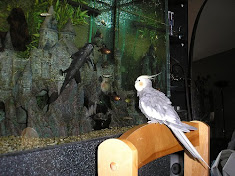While the instance of hookworm is uncommon in older dogs, they may still be infected, but if they are, the infection is usually minor and recovery from the infection is fast. Dogs should always be protected from these parasites since they can cause such major damage.
 |
| Hookworm Attached to Intestinal Mucosa by the Centers for Disease Control and Prevention |
Commonly, a dog picks up hookworms from infested soil. A dog may eat something off of the soil, and at the same time take in the eggs of the hookworms. Dogs can also be infected by roundworms, whipworms, or tapeworms in much the same way. Some of the larvae are able to burrow through muscle and membrane to the trachea, where they are coughed up and swallowed, ending up in the intestines. Other times, ingested eggs travel straight through to the intestines where they mature into adults and attach themselves to the intestinal walls. They feed on the blood of the dog and will make more eggs that are either expelled in waste by the dog, or they will go back into the bloodstream to continue the cycle.
What symptoms to look for with hookworms:
A dog's owner needs to look the dog over well for any signs of hookworm infestation. Some of the symptoms are anemia, weight loss, appearing weak or frail, and vomiting or diarrhea. A dog's gums may appear pale, and dark, tarry stools may be seen. You may also notice worm like parasites or eggs in the stool of the dog. The worst thing about hookworms is that the outward symptoms often occur only after complete infestation, when the larvae have matured into adults and have begun feeding on the dog's blood. This is especially bad for pregnant females, as the larvae may lie dormant in the dog, then get passed to the puppies before birth, or while they are nursing. Although hookworm disease is seldom fatal for the adult, it is often deadly in puppies, as their fragile immune system and small supply of blood makes them more susceptible to the dangers of the infestation.
Treatment of hookworms:
By inspecting the feces of your dog, a veterinarian can make an absolute diagnosis of hookworms. De-wormer medication is typically given to the animal to kill off the worms and help the dog evacuate them. The medicine is either a pill or liquid, and you should pay attention to the dosing recommendations of the medicine. Giving too little of the medication may not kill the worms, while giving your dog too much may actually poison him, leading to death.
Dogs typically get infested by hookworms a number of times during their lifespan. If your dog travels with you and is exposed to varied environments, he is more likely to contract the disease. It is advised to check your pet's feces periodically for signs of parasite infection, including hookworms.
Author Resource: Written by Rebecca Julia Ann
Rebecca J. Ann has a great passion for dogs. She loves dogs as much as she loves her family. Knowing that heartworm disease is one of the top 10 dog killers, she has built a site about Heartgard for Dogs, where you can find out how to prevent your dog from the deadly disease, heartworm disease. You can also read her article: Iverhart as good as Heartgard, which will help you choose the right preventative treatment for your dog.



0 comments:
Post a Comment